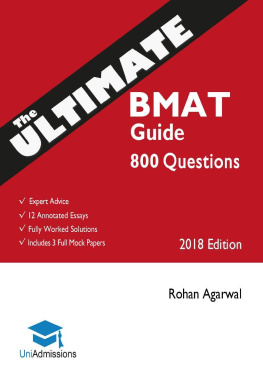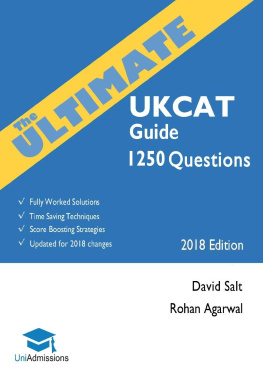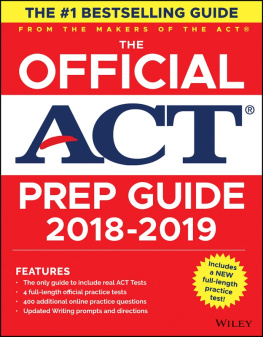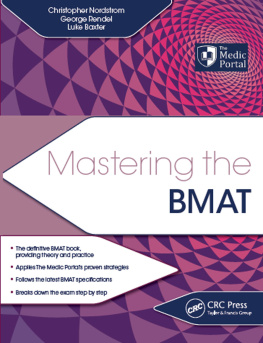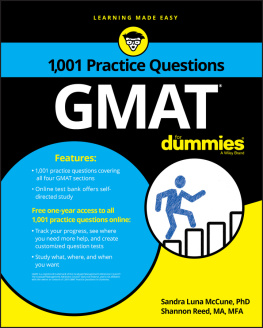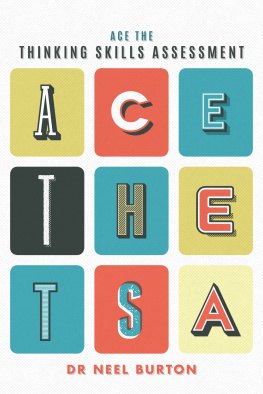TABLE OF CONTENTS
The Ultimate BMAT Guide
Copyright 2017 UniAdmissions . All rights reserved.
ISBN 978-0-9935711-9-0
No part of this publication may be reproduced or transmitted in any form or by any means, electronic or mechanical, including photocopying, recording, or by any information retrieval system without prior written permission of the publisher. This publication may not be used in conjunction with or to support any commercial undertaking without the prior written permission of the publisher.
Published by RAR Medical Services Limited
www.uniadmissions.co.uk
Tel: 0208 068 0438
This book is neither created nor endorsed by BMAT. The authors and publisher are not affiliated with BMAT. The information offered in this book is purely advisory and any advice given should be taken within this context. As such, the publishers and authors accept no liability whatsoever for the outcome of any applicants BMAT performance, the outcome of any university applications or for any other loss. Although every precaution has been taken in the preparation of this book, the publisher and author assume no responsibility for errors or omissions of any kind. Neither is any liability assumed for damages resulting from the use of information contained herein. This does not affect your statutory rights.
The Ultimate BMAT Guide
800 Practice Questions
Dr Rohan Agarwal
Edited by
Dr David Salt
About the Author
Rohan is the Director of Operations at UniAdmissions and is responsible for its technical and commercial arms. He graduated from Gonville and Caius College, Cambridge and is a fully qualified doctor. Over the last five years, he has tutored hundreds of successful Oxbridge and Medical applicants. He has also authored ten books on admissions tests and interviews.
Rohan has taught physiology to undergraduates and interviewed medical school applicants for Cambridge. He has published research on bone physiology and writes education articles for the Independent and Huffington Post . In his spare time, Rohan enjoys playing the piano and table tennis.
About the Editor
David is Director of Services at UniAdmissions , taking the lead in product development and customer service. David read medical sciences at Gonville and Caius College Cambridge, graduating in 2012, completed his clinical studies in the Cambridge Clinical School and now works as a medical doctor.
David is an experienced tutor, having helped students with all aspects of the university applications process. He has authored five books to help with university applications and has edited four more. Away from work, David enjoys cycling, outdoor pursuits and good food.
THE BASICS
What is the BMAT?
The BioMedical Admissions Test (BMAT) is a 2-hour written exam for medical and veterinary students who are applying for competitive universities.
What does the BMAT consist of?
Why is the BMAT used?
Medical and veterinary applicants tend to be a bright bunch and therefore usually have excellent grades. For example, in 2013 over 65% of students who applied to Cambridge for Medicine had UMS greater than 90% in all of their A level subjects. This means that competition is fierce meaning that the universities must use the BMAT to help differentiate between applicants.
When do I sit BMAT?
There are two sittings for the BMAT the second week of September and first week of November (normally Wednesday morning). You can generally sit the BMAT on either date however, some universities will ask that you sit the test on a specific date e.g. Oxford, Lee Kong Chian and Chulalongkorn University will only accept results from the November BMAT sitting. Youre highly advised to check which date you should sit the BMAT depending on your university choices.
When should I sit the BMAT?
The difficulty and content of both sittings is the same so the answer will depend on how much time you have over summer and how important it is for you to know your BMAT result before you submit your UCAS application. In general, if youre applying for two or more BMAT universities, its a good idea to sit the BMAT in September if circumstances allow.
Who has to sit the BMAT?
Applicants to the following universities must sit the BMAT:
Do I have to resit the BMAT if I reapply?
You only need to resit the BMAT if you are applying to a university that requires it. You cannot use your score from any previous attempts.
How is the BMAT Scored?
Section 1 and Section 2 are marked on a scale of 0 to 9. Generally, 5 is an average score, 6 is good, and 7 is excellent. Very few people (<5%) get more than 8.
The marks for sections 1 + 2 show a normal distribution with a large range. The important thing to note is that the difference between a score of 5.0 and 6.5+ is often only 3-4 questions. Thus, you can see that even small improvements in your raw score will lead to massive improvements when they are scaled.
Section 3 is marked on 2 scales: A-E for Quality of English and 0-5 for Strength of Argument
The marks for sections 3 show a normal distribution for the strength of argument; the average mark for the strength of argument is between 3 3.5. The quality of English marks are negatively skewed distribution. I.e. the vast majority of students will score A or B for quality of English. The ones that don t tend to be students who are not fluent in English.
This effectively means that the letter score is used to flag students who have a comparatively weaker grasp of English- i.e. it is a test of competence rather than excellence like the rest of the BMAT. This effectively means that if you get a C or below, admissions tutors are more likely to scrutinise your essay than otherwise.
Finally, section 3 is marked by two different examiners. If there is a large discrepancy between their marks, it is marked by a third examiner.
Can I resit the BMAT?
No, you can only sit the BMAT once per admissions cycle. You can resit the BMAT if you apply for medicine again in the future.
Where do I sit the BMAT?
For the September sitting, you will need to register yourself and sit the test at one of 20 authorised centres. In November, your school will normally register you and you can usually sit the BMAT at your school or college (ask your exams officer for more information). Alternatively, if your school isnt a registered test centre or youre not attending a school or college, you can sit the BMAT at an authorised test centre.
When do I get my results?
For the September sitting, you will get your results by the end of September online. You are then responsible for informing the University of your Score. For the November sitting, The BMAT results are usually released to universities in mid-late November and then to students in late November.

